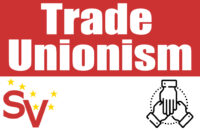Remote working, or working from home, is not something new. It has existed and been used at different stages of capitalist development and innovation, reflecting the state of technological development at that time and the cost-benefit to profit creation. Today it’s the same factors, considerations and driving forces as before.
Take weaving and the manufacture of clothes as an example. Before such things as the “Spinning Jenny” and other technological innovations in the eighteenth century, working from home was the norm in this area. Specialised crafts and artisan production, often at home or attached to homes, was the usual method of production. Pre-industrialised production was limited and local.
This is certainly not to romanticise that patriarchal and deeply divided and oppressive system of production: it is merely to show how significant changes in the production process occur in connection with technological developments, with maximising of profits as the driving force.
Fast-forward a few hundred years, and a global pandemic and new technology have unleashed a new shift towards working from home, less in material production and more in the service and tech sectors. New IT equipment and—importantly with regard to labour processes and control—new surveillance software have created the conditions under which this shift could happen.
In doing this, capital benefits in two significant ways. Firstly, their own production costs are significantly reduced. Property, rents, utility bills and sometimes even equipment costs are shifted onto workers, not to mention the psychological effect of your employer colonising a space in your home. And secondly, possibly more significantly, the potential pool of labour to make use of is opened up, both nationally and internationally, driving down the cost of labour—i.e. our wages.
This second point is worth considering a bit more. Jobs that can be done from anywhere are now opened up to a broader market. So, for example, jobs no longer “need” to be created in cities or towns but can be filled from anywhere in the country.
While this is good for a more even spread of economic development, and for climate change and sustainability (meaning less urban living), it will also, potentially, have a negative effect on wages, with a cheaper cost of living outside cities and towns bringing a competitive downward pressure on wages everywhere. Recently the software firm VMware, usually based in Silicon Valley, threatened a pay cut of 18 per cent for workers seeking to work permanently from home.
This trend is unlikely to be restricted to domestic labour markets. Remote working has the potential to proletarianise more people around the world and further internationalise production and labour markets. If a company has the capacity (legally, technically, etc.), why advertise a role in a specific country at all? Why not open it up to the cheapest market that has the desired skills? And add to this “gig economy” platforms and you can see how transformative these developments could potentially be for capital, in a positive way, and for workers and people, in a very negative way.
However, all is not lost or hopeless. These trends will increasingly internationalise our class and create opportunities for global struggle, which ultimately has the potential to move society beyond capitalism. The struggle over working time and the working week will intensify, and new health-and-safety fronts will open up.
In the nineteenth and early twentieth centuries, unions evolved from craft and artisan associations into general factory and office workers’ collectives. Unions must now seize this opportunity to renew themselves and evolve to reflect contemporary production while openly struggling to retain protections and develop new responses to the new challenges we face.
The struggle over the working week and wages will still be fundamental to our existence, and new opportunities for global solidarity and understanding our position in the world should be taken. Theory, class-consciousness and organisation remain central to our struggle.






